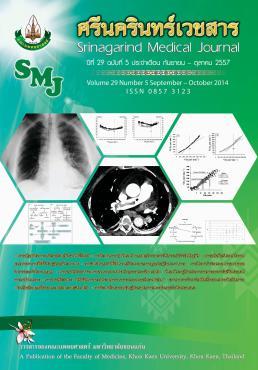Relationship of Energy and Nutrient Intakes in Middle Age Adults Based on Semi-Quantitative Food Frequency Questionaire and 24-Hour Dietary Recall
คำสำคัญ:
Energy and nutrient intake, semi-quantitative food frequency questionnaire, 24-hour dietary recall, middle age adults.บทคัดย่อ
Background and objectives: Many epidemiological studies use semi-quantitative food frequency questionnaire (SFFQ) to evaluate the relationship of dietary intake and diseases. Validated SFFQ is necessary by comparing the result with standard method. The aim of this cross-sectional descriptive study was to determine the associations between a SFFQ and 24-hour dietary recall in the assessment of energy and nutrient intakes of middle age adults.
Methods: The subjects consisted of 100 middle age adults age 35-60 years old. Food intake was assessed by using the SFFQ and 3-days for 24-hour dietary recall. Pearson correlation coefficients were used to analyze the association of energy and nutrient intakes between the two methods. The Wilcoxon matched-pairs signed-ranks test was analyzed to test the difference in energy and nutrient intakes between the two these method. Levels of agreement between the two methods were assessed by computing weighted kappa coefficients.
Results: The results showed that energy and nutrient intakes were statistically significant correlation between SFFQ and against 3-days for 24-hours dietary recalls with the exception for vitamin A. The correlations coefficient of nutrient intakes between the two methods was highest for energy (r=0.96); high for carbohydrate, protein and niacin (r=0.71-0.90); moderate for lipid, calcium, vitamin C, fiber and sugar (0.30-0.70). Energy and nutrient intakes estimated by semi-quantitative food frequency questionnaire was higher than against 3-days for 24-hours dietary recall. The weighted kappa (Kw) by the quartile groups was significantly agreement (p<0.001) except concerning vitamin A, vitamin B2 and cholesterol.
Conclusion: SFFQ appears to be reasonably valid for assessment of energy and nutrient intakes of Thai adults. The correlation and the agreement of the two methods were moderate to high for almost nutrients.




